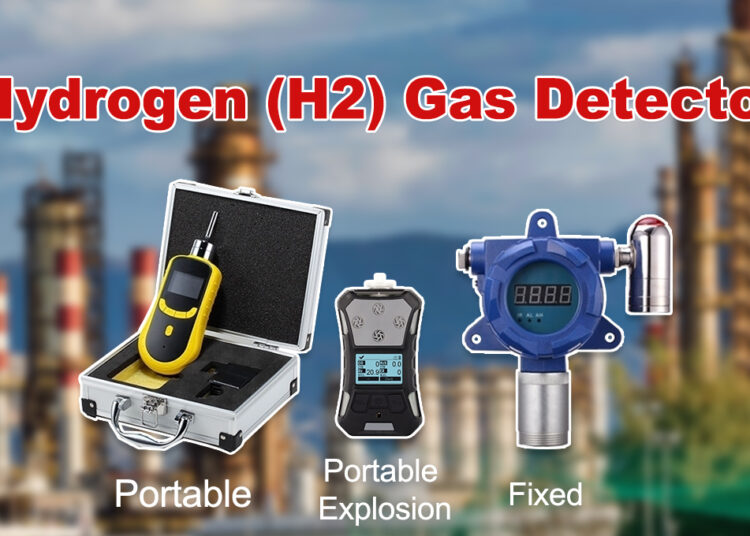Choosing a suitable H2 Gas Detector for your workplace is an important decision.
H2 Gas Detectors are used to detect the presence of hydrogen gas in the environment, and they can be a crucial part of any safety plan.
We’ll cover everything you need to know about H2 Gas Detectors, including the available types and how to properly use and maintain them.
Let’s get started!
What is H2 Gas Detector?
An H2 Gas Detector is a tool that helps keep people safe at work. It can sniff out dangerous gas called hydrogen (H2) that we can’t see or smell. It beeps if it finds any, so we know to be careful.
Types of H2 Gas Detectors
When it comes to H2 gas detectors, there are three main types that you need to know about. These include the portable hydrogen gas detector, fixed hydrogen gas detector, and portable explosion-proof hydrogen gas detector.
Portable Hydrogen (H2) Gas Detector:
The portable hydrogen h2 gas detector is a small device that can easily be carried around. It is excellent for people who work in different areas and need to check for H2 gas in different locations. It works by measuring the amount of H2 gas in the air and sounding an alarm if it reaches dangerous levels.
Fixed Hydrogen (H2) Gas Detector:
The fixed hydrogen h2 gas detector is a device that is installed in one place and monitors the air for H2 gas. It is perfect for people working in a specific location where H2 gas is likely present. This detector works the same way as the portable one but is fixed in one location.
Portable Explosion-Proof Hydrogen (H2) Gas Detector:
The portable explosion-proof hydrogen h2 gas detector is designed for people working in areas with a risk of explosions. It is built with unique materials designed to prevent any sparks from causing an explosion. This detector is excellent for people working in refineries or chemical plants.
No matter which type of H2 gas detector you choose, it is crucial to make sure that it is calibrated and tested regularly to ensure that it is working correctly.
Remember, H2 gas is dangerous and can cause explosions if not detected early enough. So, take your safety seriously and choose the suitable H2 gas detector for your workplace.
Benefits of H2 Gas Detector
Here are some benefits of using an H2 gas detector:
- Keep You Safe:
The primary benefit of using an H2 gas detector is that it can keep you safe from harm. It will sound an alarm if it detects high levels of hydrogen gas in the air, giving you enough time to evacuate the area safely.
- Easy to Use:
H2 gas detectors are elementary, making them perfect for any workplace. They usually have a simple interface with buttons to turn on and off and to set alarm thresholds. You don’t need any special training to use one.
- Reduces Accidents:
H2 gas detectors can help reduce accidents in the workplace. By detecting hydrogen gas leaks early, they can help prevent explosions or fires from happening.
- Saves Money:
H2 gas detectors are relatively inexpensive and can help save you money in the long run. By detecting leaks early, you can fix the problem before it gets worse and causes damage to your equipment.
Key Factors to Consider When Choosing an H2 Gas Detector
When choosing an H2 gas detector for your workplace, several essential factors must be remembered.
Here are some things you should consider before making a purchase:
- Accuracy is one of the most essential things in a gas detector. You want to ensure the device is reliable and can detect H2 gas at your desired levels.
- Another critical factor is range. Make sure the detector you choose can detect H2 gas at the concentrations you expect to encounter in your workplace.
- Response time is how quickly a gas detector can react to the presence of gas. Regarding H2 gas, a fast response time is crucial, as the gas can be explosive and dangerous in seconds.
- The last thing you want is a gas detector that could be easier to use or understand. Look for a device that’s easy to operate and read, even for those not trained in gas detection.
FAQs About H2 Gas Detectors
Can H2 Gas Detectors Detect Other Gases?
Most H2 gas detectors are specifically designed to detect hydrogen gas only. However, some models may be able to detect other flammable gases, such as methane and propane.
How Often Should I Calibrate My H2 Gas Detector?
Calibrating your H2 gas detector every six months is recommended to ensure its accuracy and reliability. However, the calibration frequency may depend on your workplace’s safety regulations and requirements.
Final thoughts
A suitable detector protects yourself and your workplace from H2 gas.
H2 gas can be hazardous, and you don’t want to take any risks. Remember that different types of H2 gas detectors work differently, so choose the one that is best for your workplace.
Consider how often you need to use the detector, where you will use it, and how easy it is.
Finally, make sure to follow the instructions carefully when using your detector. Also, check it regularly to make sure it is still working correctly. Stay safe and stay informed!





